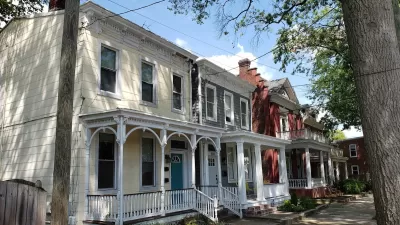Payments in lieu of taxes (PILOTs) are a popular new way for cash-strapped cities to add to their revenue by swapping voluntary payments from nonprofits for property taxes. The Lincoln Institute of Land Policy evaluates this novel practice.
Daphne A. Kenyon and Adam H. Langley, authors of the study, say that at least 117 municipalities have tried out a PILOT program since 2000.
Do PILOTs work? Kenyon and Langley conclude that yes, but it depends:
PILOTs "...have the potential to provide crucial revenue for municipalities that have a significant share of total property value owned by tax-exempt nonprofits, both as a stop-gap in the current municipal fiscal crisis and in the future. However, PILOTs rarely account for more than 1 or 2 percent of municipal revenues, so expecting these payments to eliminate local government deficits is unrealistic."
FULL STORY: The Municipal Fiscal Crisis and Payments in Lieu of Taxes by Nonprofits

Alabama: Trump Terminates Settlements for Black Communities Harmed By Raw Sewage
Trump deemed the landmark civil rights agreement “illegal DEI and environmental justice policy.”

Study: Maui’s Plan to Convert Vacation Rentals to Long-Term Housing Could Cause Nearly $1 Billion Economic Loss
The plan would reduce visitor accommodation by 25% resulting in 1,900 jobs lost.

Why Should We Subsidize Public Transportation?
Many public transit agencies face financial stress due to rising costs, declining fare revenue, and declining subsidies. Transit advocates must provide a strong business case for increasing public transit funding.

Wind Energy on the Rise Despite Federal Policy Reversal
The Trump administration is revoking federal support for renewable energy, but demand for new projects continues unabated.

Passengers Flock to Caltrain After Electrification
The new electric trains are running faster and more reliably, leading to strong ridership growth on the Bay Area rail system.

Texas Churches Rally Behind ‘Yes in God’s Back Yard’ Legislation
Religious leaders want the state to reduce zoning regulations to streamline leasing church-owned land to housing developers.
Urban Design for Planners 1: Software Tools
This six-course series explores essential urban design concepts using open source software and equips planners with the tools they need to participate fully in the urban design process.
Planning for Universal Design
Learn the tools for implementing Universal Design in planning regulations.
Caltrans
Smith Gee Studio
Institute for Housing and Urban Development Studies (IHS)
City of Grandview
Harvard GSD Executive Education
Toledo-Lucas County Plan Commissions
Salt Lake City
NYU Wagner Graduate School of Public Service





























